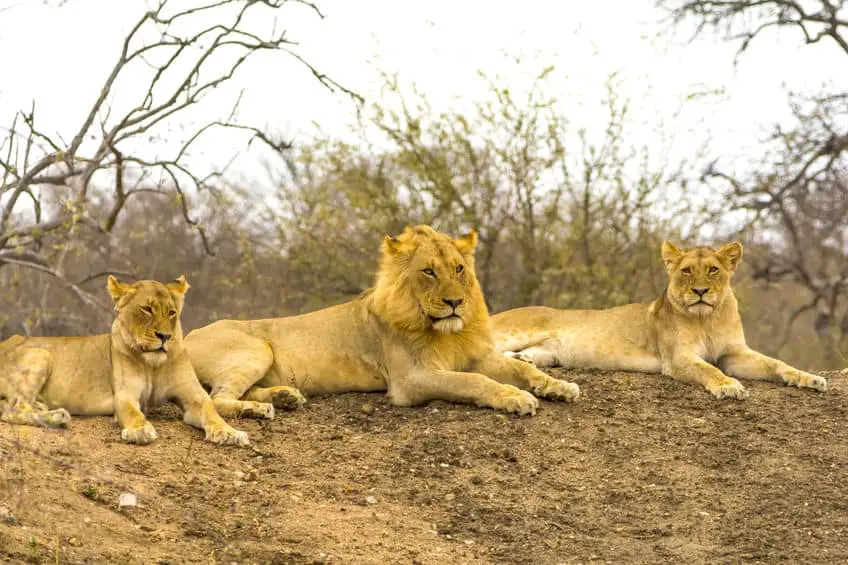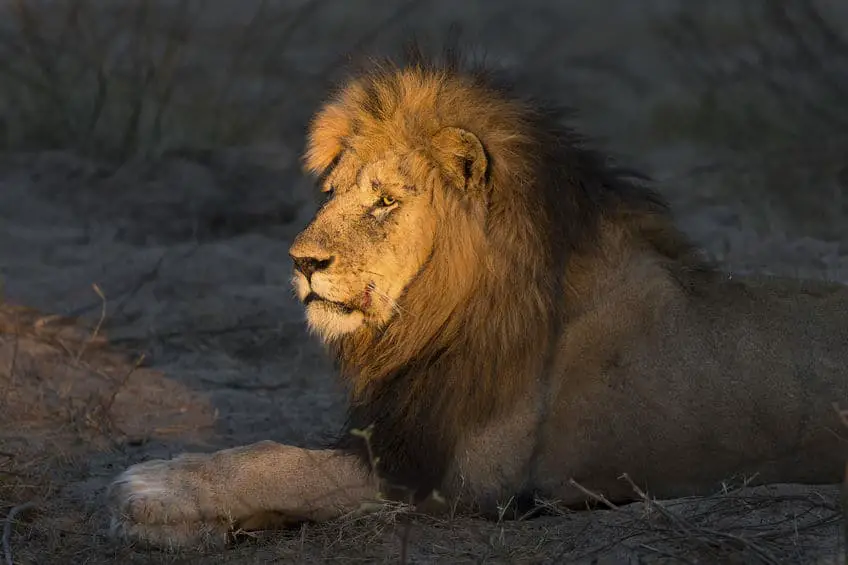Every safari tourist wants to see lions but since they are not as widely distributed as they used to be, they can be hard to find. Lucky for you, I have written this post with some tips and tricks to improve your chance of seeing lions.
To improve your chance of seeing lions in Africa, you should be out at night since lions are nocturnal animals that are active and hunt primarily at night. Lions can be seen in most sub-Saharan countries and you will have the best chances of seeing them in savannas near waterholes.
Below, I have described some of the things I have learned when it comes to improving your chances of seeing lions based on both my own experience from my trips to Africa and literature I have read about lions.

What Time of the Day is Best to See Lions in Africa?
Like most other cats, lions are nocturnal animals that are most active during the night. During the day, they spend most of their time sleeping or resting in the shadow of a tree or a large bush.
Lions can be seen both during the day and during the night but since they are nocturnal animals, you should go out when it is dark if you want to see them being active or even hunting. You can, however, also see them during the day but they tend to be much more passive and either resting or sleeping when the sun is up.
Lions sleep or rest upwards of 20 hours per day and one of the reasons for this is that since they are so large and heavy, hunting requires a tremendous amount of energy, and sleeping or resting for such a large amount of their time allows them to preserve the energy they need to hunt at night.
I have written another post about why lions sleep so much which you can see on this link if you are curious.
Hunting at night requires less energy for lions for several reasons. First of all, since the temperature is lower than when the sun is up but also because most of the animals lions prefer to hunt are active during the day and therefore easier to catch at night when they are sleeping or resting.
Many antelopes store heat in their bodies during the day and release it at night when it gets colder. This means that they do not have as much endurance at night and cannot run as fast as during the day which makes it easier for lions to hunt them.
Another advantage lions gain from hunting at night is that they have excellent night vision which makes them extremely efficient at moving silently around and sneaking up on unsuspecting animals.
If you are curious and want to learn more about why lions are nocturnal and what benefits it gives them, you can take a look at this post.
On rare occasions, you can actually also see lions being active and hunting during the day but this mostly happens on cold, cloudy days since the warm sun is not as much of a barrier for them on these days.
Where in Africa Can You See Lions?

Lions used to be widely distributed all over Asia, Europe, North America, South America, and Africa but are only found in certain regions of Africa today (except for a small population in India), and even in those regions, lions can be a rare sight.
You can see lions in most sub-Saharan African countries. I have personally seen them in the southern parts of Africa in both Namibia and South Africa but they can also be seen in both eastern, western, and central sub-Saharan Africa.
The primary habitat to look for lions in is savanna but you can also see them in forest, shrubland, grassland, and desert. During the day, they tend to rest near waterholes, both to have easy access to water but also since waterholes attract other animals that they can hunt.
Lions are not picky when it comes to eating and they can eat almost anything depending on what animals they can hunt in their territories. Their preferred prey seems to be zebra, wildebeest, Cape buffalo, and other medium-sized or large, hoofed mammals so naturally, lions are more common in areas where these animals are abundant.
Lions prefer to hunt and eat medium-sized or large mammals but they can also eat beetles, birds, snakes, and lizards. You can learn more about what lions eat here.
Do You Need Binoculars to See Lions in Africa?
In my experience, having a good pair of binoculars will significantly improve your experience on a safari and if you do not already own some, I highly recommend including a pair of binoculars in your budget when planning your trip.
Bringing binoculars is not an absolute necessity as you can be lucky and see lions and other animals up close without them but for anybody considering going on a safari, I cannot recommend it highly enough; bring binoculars! It made my own safari experiences so much more enjoyable.
If you are considering if you should buy a pair of binoculars, I recommend taking a look at this post in which I have done my best to describe everything you need to know when selecting the right pair for you as well as suggested some specific binoculars for different budgets.
Where Can You See the Biggest Groups of Lions?
A group of lions is called a pride. Lion prides can vary greatly in size from region to region and can consist of anywhere between 3 and 40 lions. Prides of lions consist of a small group of males (usually 2 to 5 but it can be more in large prides), a larger group of females that are usually all related to each other, and their cubs.
If you want to see the largest prides of lions, you should go to the eastern parts of Africa, for instance Kenya or Tanzania in the Serengeti National Park or the Masai Mara National Reserve.
In the southern and western parts of Africa, the prides are usually smaller and consist of less than 15 members but when it comes to wildlife, there are almost no rules without exceptions and as you can see in this incredible footage from the Kruger National Park in South Africa, you can certainly also see large prides of lions in the southern parts of Africa.
Go on Game Drives With Professional Rangers
When you go on safaris, you can either go on solo game drives or game drives lead by professional rangers. I have tried both and while I absolutely love both types of game drives, they each offer different advantages.
One of the major advantages of going on game drives with professional rangers is that they know the area and the behavior of the animals exceptionally well and will most often have some very qualified guesses as to where to go to have the best chances of seeing lions and other animals.
Another great advantage of going with a ranger is that they often communicate with each other so when one of them has seen something interesting, they will often inform other nearby rangers that are on game drives so they can also come and enjoy the sighting.
Solo game drives can be more difficult as almost nobody knows an area as well as the rangers that work and live there, so they may require some skill or luck.
A huge advantage from going on solo game drives (and the reason why I think those are my favorites), however, is the fact that you are absolutely free to drive anywhere you like and stay for as long as you like. You do not have to respect other tourists that may have different preferences than you or the time limits of the guided game drives. The only time limit you have to respect is that you must be back at your rest camp before the gates close which can be at different times for different rest camps but in my experience usually happened in the early evening.
